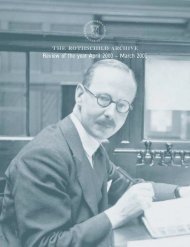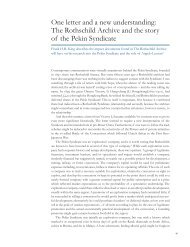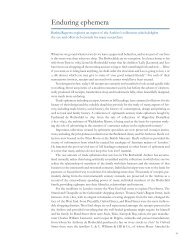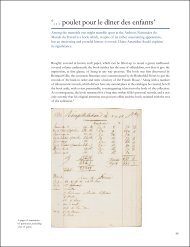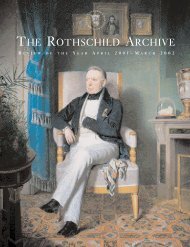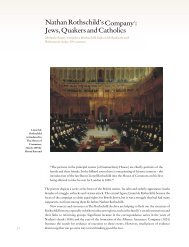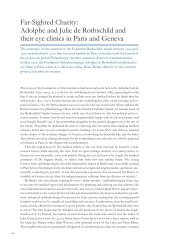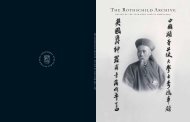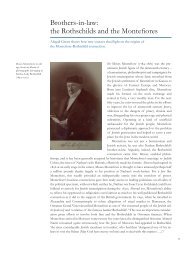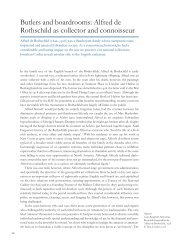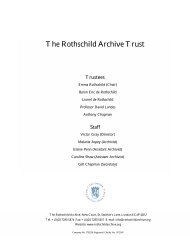66900 Rothschild Archive - The Rothschild Archive.
66900 Rothschild Archive - The Rothschild Archive.
66900 Rothschild Archive - The Rothschild Archive.
You also want an ePaper? Increase the reach of your titles
YUMPU automatically turns print PDFs into web optimized ePapers that Google loves.
52<br />
‘Madame et très chère amie – je vous remercie de votre souvenir – j’ai été assez heureux pour<br />
sauver mon pays de l’anarchie mais il faut le tirer maintenant des horreurs de l’incendie.’<br />
Although undated, the letter that is probably the earliest in the collection, almost certainly<br />
written in 1818, from Jacques Laffitte, banker and statesman, contains the only sour note.<br />
Laffitte reports to James about a meeting that has taken place during the morning (Thursday, 21<br />
May) to discuss the scope of foreign houses operating in France. James’s wish to participate in<br />
a state loan, notes Laffitte, is seen as a threat to the dignity of the government, undermining the<br />
character of benevolence and nationality that he and his group want to bring to the financial<br />
operation. <strong>The</strong> context for this letter can be found in Niall Ferguson’s account of events at the<br />
time.³ Ferguson refers to Laffitte’s memoirs, in which he claims that James was excluded from<br />
the French reparations loan in 1817 explicitly on religious grounds, primarily at the instigation<br />
of Alexander Baring. James explored the motives of his rivals in letters to his brothers and<br />
concluded that Laffitte himself was not the enemy. ‘I am having another meeting with Laffitte<br />
tomorrow and then I shall write and tell you how everything stands and you can write and say<br />
whether we should come forward on our own or not. Laffitte is proving to be a good man,<br />
indeed a very decent and worthy man for whom we must have every respect. His word is sacrosanct.<br />
He has promised that I should do it with him in partnership and so he has told the<br />
others, “If <strong>Rothschild</strong> is not included, I will go and make an offer to <strong>Rothschild</strong> on my own”’.⁴<br />
<strong>The</strong> remainder of the letters addressed directly to James demonstrate the distance the ‘foreigner’<br />
has travelled since those days and underline his skill in steering a steady course through<br />
revolutionary times. ‘<strong>The</strong>re is but one power in Europe, and that is <strong>Rothschild</strong>’, wrote French<br />
socialist Alexandre Weill. ‘He no longer needs the State, but the State still has want of him’. And<br />
not just the French state. Francisco Martinez de la Rosa, Spanish Prime Minster, writes in 1834<br />
inviting the <strong>Rothschild</strong>s to become bankers to the court of Spain and to lay the foundations for<br />
public credit; in the following year James’s great interest in the affairs of his country is noted by<br />
Portuguese statesman José da Silva Carvalho (letter of 14 November 1835).<br />
<strong>The</strong> warmest relations between the <strong>Rothschild</strong> family and the Turkish state are declared in<br />
letters to James and to Betty. Fuad Pasha, Turkish delegate to the Paris peace conference of 1856<br />
following the Crimean war, wrote to Betty in 1858, noting, ‘J’ai écrit quelque choses en turc<br />
dans votre album. Vous m’avez défendu de faire des compliments, mais vous ne pouvez pas<br />
m’empêcher de dire la verité’. <strong>The</strong> sensitivities of diplomacy are acknowledged by Mustafa<br />
Reshid Pasha writing in March 1856. He thanks James for sending his son with a letter and for<br />
the demonstrations of friendship which it contained. He wishes James to know that his son was<br />
received with all the respect that is owed to the <strong>Rothschild</strong> family, which never ceases to show<br />
its sympathies for Turkish interests.<br />
<strong>The</strong> revolution of 1848 left the <strong>Rothschild</strong> business intact, and the family at the centre of a<br />
social circle that was, in part, dispersed by exile. Family correspondence already in the <strong>Archive</strong><br />
records much of the panic that swept through the ranks of the Paris <strong>Rothschild</strong>s, with only<br />
Charlotte, Baroness Lionel’s phlegmatically-expressed belief that ‘it will never do to give up<br />
hope of a brighter European, a <strong>Rothschild</strong> future’ representing a positive attitude. Several correspondents<br />
offer reassurance and even a note of regret. On the notepaper of the Gouvernement<br />
Provisoire, Louis Blanc dissociates himself and his government from a printed circular demanding<br />
the surveillance of the <strong>Rothschild</strong>s and that they be compelled to lend money to the<br />
government (letter of 29 February 1848). Louis-Eugène Cavaignac writes cordially about<br />
arrangements for meetings; Louis-Antoine Garnier-Pagès, mayor of Paris, sends a receipt and<br />
note of thanks for James’s subscription of 50,000 francs for the wounded and the workers. <strong>The</strong><br />
prefect of police, Louis-Marie Caussidière, who ordered James to appear before him on a<br />
charge of smuggling bullion out of the country in dung carts, writes from the Market Street<br />
Hotel, Philadelphia on 10 February 1854, thanking the former accused for his kindness and<br />
services during the writer’s current misfortune.



